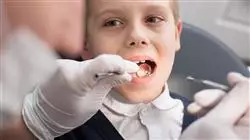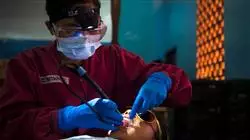University certificate
The world's largest faculty of dentistry”
Introduction to the Program
Thanks to this Postgraduate diploma, you will renew your knowledge on basic behavioral guidance techniques for underage patients with odontophobia"

For many people, just the thought of having to go to the dentist is already a stress, which sometimes prevents them from making the decision to go, despite the importance and even urgency that may have the oral problem they suffer. A reluctance that goes against the very dental care that is so necessary. This program, taught by a specialized teaching team, will update the knowledge of professionals who have to face patients who panic about pain in their daily work.
Throughout the 6-month program, students will learn the basics of pediatric dentistry, psychology and behavioral guidelines for children and adolescents, as well as the different techniques used for the prevention of caries. Through innovative multimedia content, the professional will achieve the renewal of knowledge they are looking for, while being able to get even closer to their daily practice, thanks to the real clinical cases presented by the faculty that integrates this program.
In addition, TECH uses the Relearning system in all its programs, with which you will be able to progress through the 475 teaching hours of this program in a more natural way and without the long hours of study that characterize other teaching methods.
An excellent opportunity for the dental professional looking to keep up to date with the latest developments in their field through a flexible program that can be accessed whenever and wherever they wish. All you need is an electronic device with an internet connection to update your knowledge. A 100% online modality, without fixed schedules, which allows you to combine your personal responsibilities with an education that is at the academic forefront.
In addition, the program includes 10 masterclasses of 10 minutes each, prepared by a leading figure in the international field of pediatric dentistry. Top-level professionals who have agreed to collaborate with TECH and to share their experience with the students who enroll in this Postgraduate diploma giving them the opportunity to learn from their prestigious praxis, as well as the strategies and techniques that have elevated their career to the top of the sector.
A Postgraduate diploma that is flexible and compatible with your professional responsibilities”
This Postgraduate diploma in Pain, Fear and Anxiety in Pediatric Dental Patients contains the most complete and up-to-date program on the market. Its most notable features are:
- Practical cases presented by experts in Dentistry
- The graphic, schematic, and practical contents with which they are created, provide scientific and practical information on the disciplines that are essential for professional practice
- Practical exercises where self-assessment can be used to improve learning
- Its special emphasis on innovative methodologies
- Theoretical lessons, questions to the expert, debate forums on controversial topics, and individual reflection assignments
- Content that is accessible from any fixed or portable device with an Internet connection
Having the support of a renowned figure in the field of Pediatric Dentistry with access to 10 exclusive masterclasses will allow you to learn about their strategies for success"
The program’s teaching staff includes professionals from the sector who contribute their work experience to this program, as well as renowned specialists from leading societies and prestigious universities.
The multimedia content, developed with the latest educational technology, will provide the professional with situated and contextual learning, i.e., a simulated environment that will provide immersive knowledge programmed to learn in real situations.
This program is designed around Problem-Based Learning, whereby the professional must try to solve the different professional practice situations that arise throughout the program. For this purpose, the student will be assisted by an innovative interactive video system created by renowned and experienced experts.
Access the latest scientific advances in local anesthesia in pediatric dentistry"

A Postgraduate diploma, which will allow you for 6 months to update your knowledge on the fundamentals of pediatric dentistry"
Why study at TECH?
TECH is the world’s largest online university. With an impressive catalog of more than 14,000 university programs available in 11 languages, it is positioned as a leader in employability, with a 99% job placement rate. In addition, it relies on an enormous faculty of more than 6,000 professors of the highest international renown.

Study at the world's largest online university and guarantee your professional success. The future starts at TECH”
The world’s best online university according to FORBES
The prestigious Forbes magazine, specialized in business and finance, has highlighted TECH as “the world's best online university” This is what they have recently stated in an article in their digital edition in which they echo the success story of this institution, “thanks to the academic offer it provides, the selection of its teaching staff, and an innovative learning method aimed at educating the professionals of the future”
A revolutionary study method, a cutting-edge faculty and a practical focus: the key to TECH's success.
The most complete study plans on the university scene
TECH offers the most complete study plans on the university scene, with syllabuses that cover fundamental concepts and, at the same time, the main scientific advances in their specific scientific areas. In addition, these programs are continuously being updated to guarantee students the academic vanguard and the most in-demand professional skills. In this way, the university's qualifications provide its graduates with a significant advantage to propel their careers to success.
TECH offers the most comprehensive and intensive study plans on the current university scene.
A world-class teaching staff
TECH's teaching staff is made up of more than 6,000 professors with the highest international recognition. Professors, researchers and top executives of multinational companies, including Isaiah Covington, performance coach of the Boston Celtics; Magda Romanska, principal investigator at Harvard MetaLAB; Ignacio Wistumba, chairman of the department of translational molecular pathology at MD Anderson Cancer Center; and D.W. Pine, creative director of TIME magazine, among others.
Internationally renowned experts, specialized in different branches of Health, Technology, Communication and Business, form part of the TECH faculty.
A unique learning method
TECH is the first university to use Relearning in all its programs. It is the best online learning methodology, accredited with international teaching quality certifications, provided by prestigious educational agencies. In addition, this disruptive educational model is complemented with the “Case Method”, thereby setting up a unique online teaching strategy. Innovative teaching resources are also implemented, including detailed videos, infographics and interactive summaries.
TECH combines Relearning and the Case Method in all its university programs to guarantee excellent theoretical and practical learning, studying whenever and wherever you want.
The world's largest online university
TECH is the world’s largest online university. We are the largest educational institution, with the best and widest online educational catalog, one hundred percent online and covering the vast majority of areas of knowledge. We offer a large selection of our own degrees and accredited online undergraduate and postgraduate degrees. In total, more than 14,000 university degrees, in eleven different languages, make us the largest educational largest in the world.
TECH has the world's most extensive catalog of academic and official programs, available in more than 11 languages.
Google Premier Partner
The American technology giant has awarded TECH the Google Google Premier Partner badge. This award, which is only available to 3% of the world's companies, highlights the efficient, flexible and tailored experience that this university provides to students. The recognition as a Google Premier Partner not only accredits the maximum rigor, performance and investment in TECH's digital infrastructures, but also places this university as one of the world's leading technology companies.
Google has positioned TECH in the top 3% of the world's most important technology companies by awarding it its Google Premier Partner badge.
The official online university of the NBA
TECH is the official online university of the NBA. Thanks to our agreement with the biggest league in basketball, we offer our students exclusive university programs, as well as a wide variety of educational resources focused on the business of the league and other areas of the sports industry. Each program is made up of a uniquely designed syllabus and features exceptional guest hosts: professionals with a distinguished sports background who will offer their expertise on the most relevant topics.
TECH has been selected by the NBA, the world's top basketball league, as its official online university.
The top-rated university by its students
Students have positioned TECH as the world's top-rated university on the main review websites, with a highest rating of 4.9 out of 5, obtained from more than 1,000 reviews. These results consolidate TECH as the benchmark university institution at an international level, reflecting the excellence and positive impact of its educational model.” reflecting the excellence and positive impact of its educational model.”
TECH is the world’s top-rated university by its students.
Leaders in employability
TECH has managed to become the leading university in employability. 99% of its students obtain jobs in the academic field they have studied, within one year of completing any of the university's programs. A similar number achieve immediate career enhancement. All this thanks to a study methodology that bases its effectiveness on the acquisition of practical skills, which are absolutely necessary for professional development.
99% of TECH graduates find a job within a year of completing their studies.
Postgraduate Diploma in Pain, Fear and Anxiety in the Pediatric Dental Patient
Dental care in children is vitally important to ensure good oral health throughout their lives. However, it is common for pediatric dental patients to experience pain, fear and anxiety during dental visits. If you want to specialize in managing these emotions and provide optimal dental care for children, the Postgraduate Diploma in Pain, Fear and Anxiety in the Pediatric Dental Patient from TECH Global University is the learning you're looking for. This online program is designed for dentists and healthcare professionals who want to gain advanced knowledge and techniques for managing pain, fear and anxiety in patients. You will learn effective strategies to create a safe and comfortable environment, establish appropriate communication with children and their parents, and apply pain management techniques to minimize discomfort during dental procedures. You will have the theoretical knowledge necessary to understand the causes and consequences of pain, fear and anxiety in children during dental visits. You will learn how to identify and assess the anxiety level of patients, as well as how to implement fear and anxiety management strategies, such as the desensitization technique and cognitive distraction.
Thanks to you, children will enjoy going to the dentist.
This program will address local anesthesia and conscious sedation techniques in pediatric patients, providing guidelines for proper administration and management of adverse effects. Effective communication strategies with children and their parents will also be explored, with the aim of building trust and reducing anxiety before, during and after dental treatment. The program is developed in an online environment, which allows you to access the contents and study materials from anywhere and at any time. You will have access to interactive resources, clinical cases and practical activities that will allow you to apply the acquired knowledge effectively in your professional practice.







